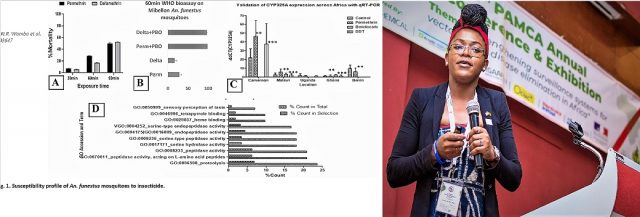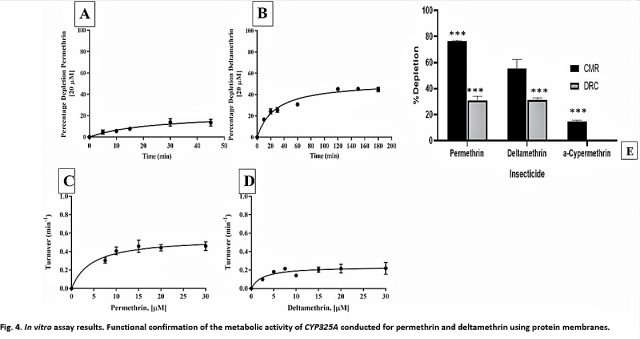In her recent publication, Amelie Wamba demonstrated that, Cytochrome P450 CYP325A is now one of the major drivers of pyrethroid resistance in the major malaria vector Anopheles funestus in the Central Africa Sub-region.

Amelie Wamba presenting the results of her researches during a conference
This study investigated the role of the overexpressed CYP325A P450 gene in pyrethroid resistance in Anopheles funestus mosquito populations in Cameroon. The study revealed that, this gene contributes to insecticide resistance in type I and II pyrethroids in the Central African Sub-region. These findings will help pave the way to detect the associated molecular markers to pyrethroid-based metabolic resistance and facilitate the design of Deoxyribonucleic Acid (DNA)-based diagnostic tools to track this resistance in the field. Amelie Wamba justifies this study by the fact that, the World Health Organisation (WHO) in its 2020 report, highlighted that, Malaria remains the major cause of death in Africa with approximately 94% of the global burden. Out of 229 million malaria cases reported in 2019, 409,000 deaths were recorded worldwide with the highest mortality in pregnant women and children under five years. Cameroon bears about 3% of this global burden. In 2019, malaria accounted for 23.6% of consultations in health centres in Cameroon, 68.7% of deaths in children below five years and 16.9% of deaths in pregnant women. Amelie mentioned the fact that across Africa in general and particularly in Cameroon, major vectors of malaria are Anopheles gambiae and Anopheles funestus. In this study, blood-fed female Anopheles mosquitoes were collected in Mibellon, a rural community in the Adamawa Region of Cameroon. This region forms a transition between the forested south and northern savannah of Cameroon with intense agricultural practices involving the use of insecticides. Other mosquito samples used in this study were samples collected during previous studies conducted across Africa between 2016 and 2019. The pyrethroid resistance profiles of these mosquito populations were previously established.

Amelie investigated the role played by CYP325A in pyrethroid resistance in resistant populations of Anopheles funestus from Cameroon and Central Africa. Up-regulation of this gene was highly associated with resistance to both type I and II pyrethroids in field populations of Anopheles funestus in Cameroon. Through qRT-PCR experiments, in vitro recombinant protein expression, metabolic assays, and in silico modelling and molecular docking simulations, Amelie found that, CYP325A can metabolise both type I and II pyrethroids, though with greater efficiency against type I. Finding that CYP325A could metabolise α-cypermethrin points to another concern that is resistance intensity and escalation. Knowledge of the underlying mechanisms and molecular drivers of insecticide resistance is crucial in the efficient management of insecticide resistance in malaria vectors. Amelie established that, the overexpressed P450 CYP325A is highly implicated in the resistance against the bed net insecticides permethrin and deltamethrin in Anopheles funestus mosquito population in Cameroon and Central Africa and could be a threat to the efficacy of these category of bed nets use in vector control. These findings could inform NMCPs on the choice of bed nets to distribute in different localities based on their insecticide resistance profile as well as the implementation of insecticide rotation plan in Indoor Residual Spraying (IRS). Amelie Wamba is a young dynamic Cameroonian, a PhD candidate in Biochemistry at the University of Yaoundé I, Cameroon. She is a scholarship holder at the Centre for Research in Infectious Diseases (CRID). Her work is focused on “elucidating insecticide resistance mechanisms in malaria vectors across Africa”. Besides her academic endeavours, Amelie is actively engaged in community-based activities and has been involved in five national health and demographic surveys in several communities in Cameroon. As an Alumni of the Mandela Washington Fellowship, Amelie aspires to further reduce the gap between research and policy-making for more effective and integrated vector control strategies, while taking advantage of the Partnership for Increasing the Impact of Vector Control (PIIVeC) implemented at CRID, to increase community awareness and involvement in the fight against malaria through better personal /community hygiene and proper use of bed nets.





